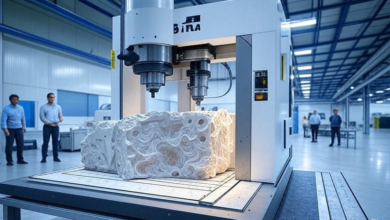The Strategic Importance of Choosing the Right Hardware Manufacturer in Today’s Global Market

In a global economy shaped by technological advancement and supply chain complexities, manufacturers must align with suppliers that offer more than just competitive pricing. They need partners who understand the importance of customization, precision, quality assurance, and on-time delivery. This makes selecting a trusted hardware manufacturer not just a procurement decision—but a strategic business move.
Whether you’re a company producing electronic devices, assembling vehicles, building infrastructure, or crafting consumer goods, the hardware components that support your products play a vital role in performance, safety, and reliability. A skilled hardware manufacturer ensures that every screw, bracket, spring, or fastener meets your product’s exact requirements—consistently, efficiently, and at scale.
What Does a Hardware Manufacturer Do?
A hardware manufacturer is a specialized company that produces mechanical parts and accessories used in a wide variety of products. These include:
- Fasteners (screws, bolts, nuts, rivets, anchors)
- Springs (compression, torsion, extension)
- CNC machined components
- Stamped or forged parts
- Plastic and metal enclosures
- Brackets, hinges, and locks
- Battery clips and terminals
Such manufacturers may serve multiple industries, each with unique specifications, certifications, and tolerance requirements. While the products may appear simple, the precision and durability of these components often determine the long-term success of the final product.
See also: How Technology is Transforming Logistics in Hong Kong
Why the Right Hardware Manufacturer Matters
1. Precision Engineering and Quality Control
Hardware is often the unseen backbone of any product. A loose screw or a weak bracket can result in structural failure, equipment malfunction, or safety hazards. This is why precision engineering and rigorous quality control are non-negotiable.
A reputable hardware manufacturer maintains high manufacturing standards, often certified by ISO or IATF, and performs strict inspections at every stage—from raw materials to finished goods. Their use of automated tools, CMMs (Coordinate Measuring Machines), and endurance testing ensures each batch meets the technical specifications provided by clients.
2. Customization Capabilities
Not all products are built from standard off-the-shelf components. More often than not, companies need customized hardware tailored to their specific product designs or application conditions. A capable hardware manufacturer offers custom manufacturing services, including:
- 3D modeling and prototyping
- Die and mold development
- Tolerance optimization
- Finishing options like galvanizing, powder coating, or anodizing
- Custom packaging and branding
These services reduce the time from design to production and eliminate the need for multiple vendors.
3. Mass Production Scalability
When you’re scaling production, consistency is key. A professional hardware manufacturer has the facilities, equipment, and manpower to handle large-volume orders without compromising on quality or lead times. Whether you need 1,000 or 1,000,000 pieces, scalability ensures seamless operations throughout your growth phase.
Additionally, many manufacturers now offer just-in-time delivery or flexible scheduling, enabling clients to better manage inventory and avoid unnecessary storage costs.
4. Competitive Pricing
One of the biggest advantages of working with a hardware manufacturer—especially one based in Asia—is the ability to source cost-effective parts without compromising performance. Thanks to economies of scale, local material availability, and optimized production lines, these manufacturers can offer significantly lower prices than Western counterparts.
However, price should never be the only deciding factor. The right hardware manufacturer combines affordability with trust, responsiveness, and consistent delivery.
5. Global Export and Compliance Expertise
With increasingly complex international trade rules and product safety standards, having a supplier who understands global compliance is a game-changer. Top manufacturers are well-versed in export protocols, material certifications (RoHS, REACH, etc.), and customs documentation.
This reduces delays at ports, minimizes the risk of rejected shipments, and streamlines the entire logistics process.
Industries That Rely on Hardware Manufacturers
✔ Automotive
High-strength bolts, spring-loaded components, and vibration-resistant fasteners are essential in vehicles. Precision and durability are critical.
✔ Construction and Infrastructure
Buildings rely on dependable anchors, hinges, door closers, and structural support hardware to maintain integrity over time.
✔ Consumer Electronics
Miniaturized fasteners, battery connectors, and custom CNC components are used in phones, laptops, and smart devices.
✔ Medical Equipment
Sterile-grade stainless steel hardware is used in surgical instruments, diagnostics, and lab automation.
✔ Aerospace and Defense
Lightweight, high-strength alloys are shaped into critical components that must endure extreme conditions.
✔ Furniture and Home Appliances
Aesthetic and functional hardware such as handles, knobs, drawer slides, and screws are integral to user experience.
No matter the industry, a hardware manufacturer plays a behind-the-scenes role in ensuring reliability and user satisfaction.
How to Choose the Right Hardware Manufacturer
Selecting a long-term manufacturing partner requires more than browsing an online catalog. Here’s what to look for:
🔹 Experience and Track Record
Ask how long they’ve been in business, what industries they serve, and request client testimonials or case studies. A seasoned hardware manufacturer brings process knowledge that shortens your learning curve.
🔹 Engineering and R&D Support
A good manufacturer will go beyond production—they’ll help you improve designs, reduce costs, and solve engineering challenges.
🔹 Quality Certifications
Check for ISO 9001, IATF 16949, or similar standards. Also ask if they provide first article inspection reports (FAIR), material certificates, and dimensional test results.
Final Thoughts
The components that hold, connect, or support your products may be small in size, but their impact is massive. Whether it’s a fastener in a medical device or a bracket in a solar panel system, these parts are foundational to the product’s reliability and user satisfaction.
Partnering with a professional hardware manufacturer isn’t just about cutting costs—it’s about building a reliable, scalable, and future-proof supply chain. By choosing a manufacturer that offers quality, innovation, and trust, you’re making an investment in the long-term success of your business.
In today’s highly connected world, where a delay or defect can damage your brand’s reputation, aligning with the right manufacturing partner is more important than ever. A skilled and reputable hardware manufacturer ensures that you not only meet your production goals but exceed your customer expectations every step of the way.





